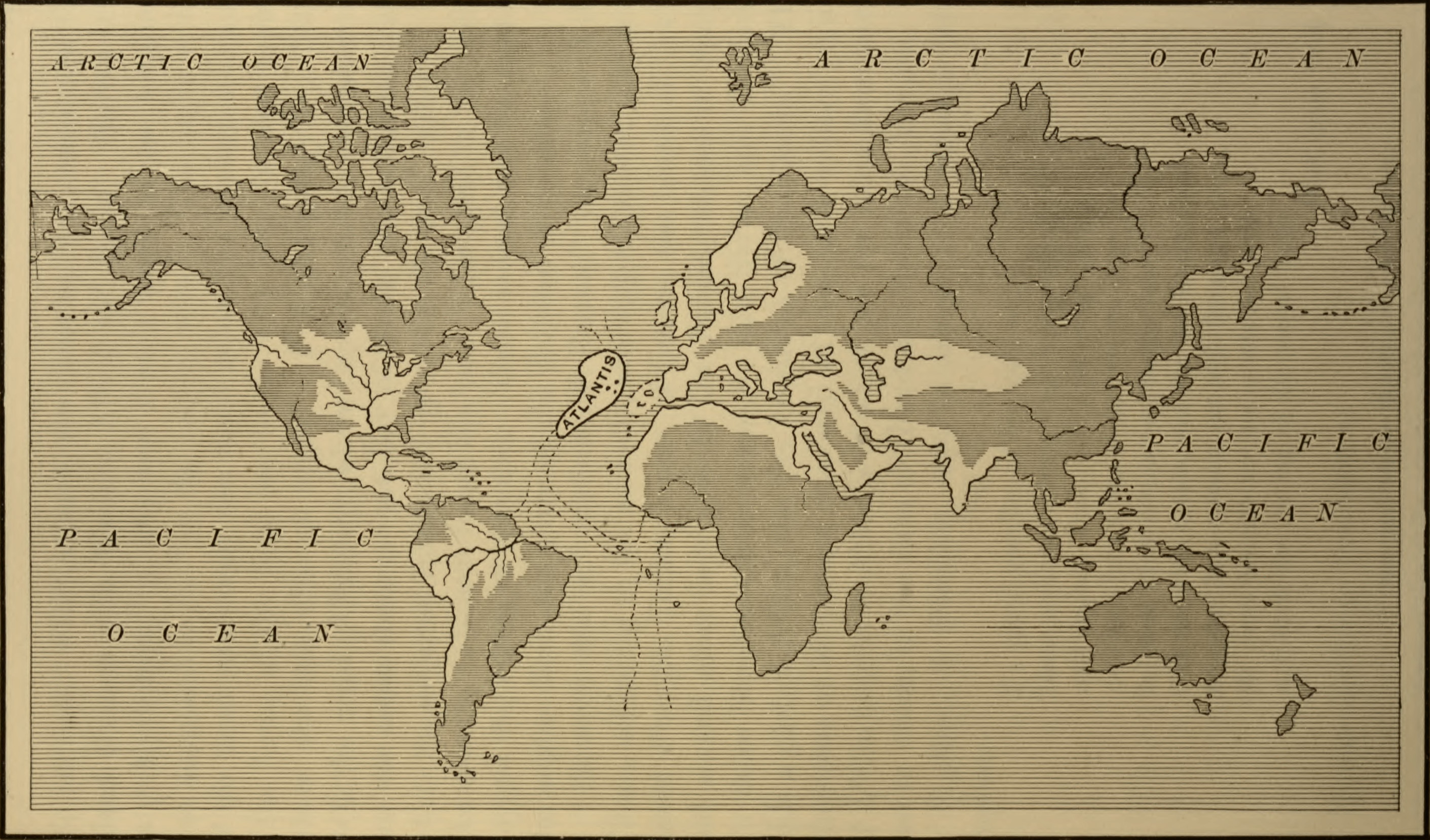 Sources
Sources
The Atlantis myth comes from Plato's late works "Timaeus" and "Critias", which were written between 360 BCE and 347 BCE. The dialog "Critias" remained unfinished. In these texts, Plato describes the history of the mythical island kingdom of Atlantis, which supposedly existed in the Atlantic Ocean and was ruled by a powerful royal dynasty.
Atlantis is depicted as an advanced and prosperous civilization that was ultimately punished by the gods due to its excessive lust for power and moral decay. According to Plato's work, Atlantis was a great maritime power that dominated many parts of Europe and Africa. However, its expansion brought it into conflict with ancient Athens, which was considered the leading city-state in the world at the time. At a critical moment, the gods intervened and sank Atlantis into the sea, causing it to disappear forever.
 Timaeus
Timaeus
Timaeus is a dialogue by Plato that explores the creation of the universe by a divine craftsman who organizes chaos into order. The dialogue introduces the myth of Atlantis, describing it as a powerful, advanced civilization that existed 9,000 years before Plato's time and had interactions with ancient Athens.
Main Page: Timaeus
 Critias
Critias
Critias is a dialogue by Plato that narrates the story of the lost island of Atlantis. The dialogue continues from Timaeus and compares Atlantis with ancient Athens, describing how Atlantis, a powerful and technologically advanced island civilization, emerged, became morally corrupt and attempted to conquer Athens. Atlantis was ultimately destroyed by the gods, sinking into the ocean. The dialogue remains unfinished.
Main Page: Critias
 Discussion
Discussion
 Did Atlantis really exist?
Did Atlantis really exist?
In his late works Timaeus and Critias, Plato wrote quite precisely where the island of Atlantis, which was about the size of Great Britain, must have been located: it was in front of the Pillars of Heracles, i.e. in the Atlantic.
Plato further wrote: "From it one could cross over to the other islands, and from the islands to the entire mainland (America) opposite, which surrounds that ocean (the Atlantic). All that is within the aforementioned estuary (the Mediterranean) appears as a mere bay with a narrow entrance, but that ocean (the Atlantic) can rightly be called an ocean and the land (America) surrounding it can rightly be called the mainland.
The longitude of Atlantis was given quite precisely: Since the king's island had a hot spring, there must have been volcanic activity on the island. Atlantis must therefore have been located on the mid-Atlantic ridge.
The latitude was also given quite precisely: Since two harvests could be brought in each year, Atlantis must have been located near the equator.
Consequently, Atlantis must have been south of the Azores and part of the Mid-Atlantic Ridge. Unfortunately, however, there does not seem to have been an island of sufficient size here that sank. This suggests that the island of Atlantis never existed.
 The Origin of the Myth
The Origin of the Myth
According to Plato, the sinking of Atlantis took place around 10,000 BCE. However, as writing was not invented in Egypt until around 3300 BCE, there could not have been any records of the event in Egypt. In fact, no records of Atlantis have been found in Egypt either. Consequently, the Atlantis story cannot be completely true. Alternative explanations are:
- The account is largely true, but the sinking of Atlantis took place much later, around 4000 BCE.
- The Egyptian priest lied to Solon.
- Plato made up the Atlantis story.
- Plato channeled the Atlantis story.
The fact that no records on Atlantis were found in Egypt speaks against explanation (1). In addition, Plato explicitly dated his story to well before the Flood. It is doubtful that 4000 BCE can be regarded as well before the Flood.
Explanation (2) is supported by the fact that the priest had a motive to lie to Solon. To the priest, Solon's myths, which he had told him, seemed like children's fairy tales. He may therefore have decided to tell Solon a fairy tale too.
Explanation (3) is supported by the fact that Plato was already very old at this time and he may have wondered how he could ensure that he would not be forgotten after his death. Plato realized that the Atlantis narrative had the potential to perpetuate the memory of him, for he wrote:
"If only, Amynander, he had not pursued poetry merely as a secondary matter, but had devoted himself to it with all his zeal like others, and had completed the story he brought back from Egypt, and had not been forced to give it up by the troubles and all the other damages he found here on his return, I think that neither Homer nor Hesiod nor any other poet would ever have become more famous than he."
Explanation (4) is supported by the fact that Atlantis is still the subject of many channeled texts today. For example, Atlantis also appears in the book "The Secret Doctrine" by Helena Blavatsky (1888). The fact that Plato himself described evidence for the accuracy of his story as sacred also suggests that it was channeled:
"Sacred signs of the truth of my present tale about our land still exist where the rivers once had their source."
Another important reason for assuming that Plato channeled the Atlantis story is that it contains information that Plato himself did not have. For example, the narrative gives a correct description of the Atlantic Ocean and its size in relation to the Mediterranean.
To summarize, the fourth explanation is probably the most likely.

